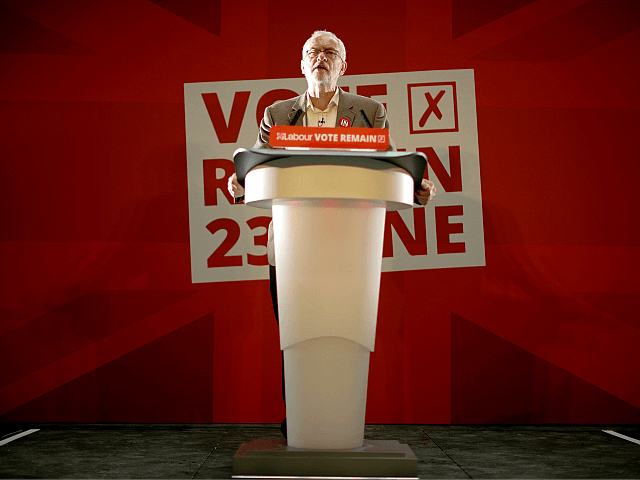Jeremy Corbyn has said that the Labour Party would back Remain in a second referendum, rather than back a clean break or the Conservative Party’s soft-Brexit deal.
The party leader wrote in a statement to party members on Tuesday: “Whoever becomes the new prime minister should have the confidence to put their deal, or no deal, back to the people in a public vote.
“In those circumstances, I want to make it clear that Labour would campaign for remain against either no Deal or a Tory deal that does not protect the economy and jobs.”
The Guardian adds that the statement does not make reference to the position that Labour would take in the event of a snap general election before Brexit day, or whether under such circumstances if it would still commit to leaving the EU.
The announcement came after some of the UK’s most power trades unions agreed a common position on Labour’s Brexit policy, saying that the party should back a second referendum and campaign for Remain.
The motion was agreed on Monday by the Labour Party’s affiliated unions, including Unison, the GMB, CWU, Aslef, and Unite, the latter’s general secretary Len McCluskey, a key ally of party leader Jeremy Corbyn, having hitherto been against a second referendum.
Labour Could Lose Forty Seats to Farage's #Brexit Party in Working-class Heartlands https://t.co/1qkNzY79dk
— Breitbart London (@BreitbartLondon) June 24, 2019
The unions insisted that Labour must campaign for a second referendum — or “confirmatory vote” — on any deal put to parliament by the Conservative government or in the event of no-deal. But if there is a snap election before the UK leaves the EU and Labour wins, once in government it should seek to deliver Brexit by working to agree its own deal with the European Union.
The unions say that that new deal should still be put to the people in a second referendum, with Remain also on the ballot, but that the party should not state whether it would back Remain and campaign against its own deal, with the agreement saying: “The Labour Party’s campaign position on such a ballot should depend on the deal negotiated.” This would leave it unclear what would be detailed in a potential snap election Labour manifesto.
One senior shadow cabinet source told The Guardian: “Unions have backed a referendum on any deal this parliament and Labour campaigning for remain – that’s a big victory. What’s in a manifesto is a debate for another day.”
Another MP was cautious over the proposal and its wording, telling the left-wing newspaper: “It is not exactly the absolute clarity we were hoping for… It sounds like we are reserving the right to campaign for remain against our own Brexit deal – that will just sound ludicrous to voters.”
A Conservative Party spokesman told The Sun: “It makes clear Labour have no interest in delivering on the referendum result.”
Brexiteer Labour MP Kate Hoey to Stand Down at Next Election https://t.co/NHqUNbgWt5
— Breitbart London (@BreitbartLondon) July 8, 2019
The party’s new position could see the some five million Brexit-supporting Labour voters in the heartlands betrayed by their party, prompting them to switch their political affiliations.
Labour’s Caroline Flint warned in June that her party could lose 40 seats to Nigel Farage’s Brexit Party in the House of Commons if it backed a second referendum and Remain, with Ms Flint saying: “If we don’t speak for the voices of the working-class Britain, what’s the point of the Labour Party?”
The Labour Party was traditionally the home of working-class euroscepticism, with political heavyweights including Tony Benn and Peter Shore campaigning against integration with the then-European Economic Community. The party will also be losing one of its biggest pro-Leave figures at the next General Election, with MP for Vauxhall Kate Hoey, 73, announcing on Monday that she would be stepping down at the next national vote.
The party has already lost local politicians to the Brexit Party, with two Rochdale councillors defecting earlier this month due to Labour going “back on its word” to respect the 2016 referendum result. The resignations came as Labour slumped to fourth place in a YouGov poll, one of its worst results in a century.
Local Labour Politicians Defect to Brexit Party as Labour Slumps in Polls https://t.co/EbXVF8FHDM
— Breitbart London (@BreitbartLondon) July 5, 2019

COMMENTS
Please let us know if you're having issues with commenting.